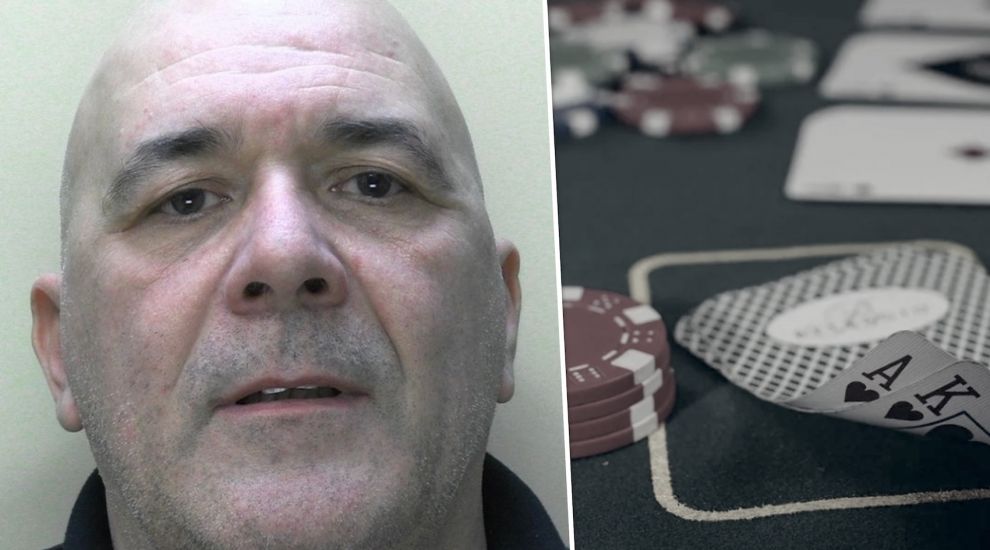


Losing £60,000 in a drunken game led a poker player to attempt to smuggle cocaine worth up to £25,000 into Jersey to repay his “dangerous” opponents, the Royal Court heard yesterday.
Fulham-born Andrew John Bennett (56) was sentenced to seven-and-a-half years' in prison for what Commissioner Julian Clyde-Smith, sitting with Jurats Collette Crill, Jane Ronge and Robert Christensen MBE, described as a "foolish" decision yesterday.
Having flown from Bristol on 30 April this year, Bennett was stopped by a Customs and Immigration officer at the airport.
Travelling alone, he said he was in the island for three days to play poker in two of "local clubs" - one of which he couldn't remember the location of.
He was found to have a white iPhone in a case, which also contained a bank card not in his own name.

Pictured: Bennett was stopped at the airport and arrested in April of this year.
Inside the rucksack, the officer found a silver iPad, prescription medicine, clothing and a blue plastic carrier bag inside a small zipped compartment.
In the blue carrier bag was some white tissue paper and a clingfilm wrapped cylindrical package containing white powder - when asked what the wrap contained, the defendant said he didn't know.
After this he was arrested and cautioned, and his iPhone and iPad were seized. He was further searched and was found to have a bundle of cash in various denominations, totalling £375.77.
When the package was analysed, it was found to contain 125.65g of cocaine, with an average purity of 60%. Its street value was estimated to be between £18,000 and £25,000, with a wholesale value of between £9,000 and £11,000.
He was interviewed under caution that day, where, apart from stating his name and date of birth, he remained silent.
Though his iPhone and iPad devices were sent for analysis, they could not be opened without the passcodes.
In May, Bennett was served with a notice requiring him to give the passcodes, which he did not comply with.
Pictured: He was sentenced in the Royal Court yesterday.
Prosecuting, Advocate Sam Brown said that Bennett had "imported a significant quantity of cocaine at relatively high purity that was to be sold on the streets of Jersey" and was a "a trusted courier performing a valuable function in the supply of drugs in the Jersey community."
He said the Crown recommend a sentence of seven years for the importation, and 15 months for the failure to disclose the passcodes, giving a total sentence of eight years and three months.
Defending Bennett, Advocate Julia Anne-Dix said that he was "not a sophisticated drug mule", and had committed the offence due to "desperate measures" arising from a gambling debt.
Though she acknowledged there was no mitigation for threats, she said that Mr Bennett's explanation was that he had travelled to Jersey and locations in the UK on several occasions as a poker player throughout his life, living off his winnings.
However, during a game in March 2021, he said he found himself £60,000 in debt after consuming too much alcohol.
He told Advocate Dix that soon after, he learnt the people he had been playing with were "very dangerous", and that he "had to pay money back straight away or had to do something to pay the debt, otherwise something would happen to his family."
She said this was why he would not give officers his pin codes.
She acknowledged the prosecution had not believed this explanation, but invited the court to look through a black book found in his rucksack when he was arrested, which recorded his poker games.
In the section in March 2021, a week before he was arrested, there was a diary entry reading: "Totally f***ed. Worst ever."
She said he was aware it was a "foolish decision to undertake crime to pay back debts", and had "accepted full responsibility."
Concluding, Commissioner Clyde-Smith said the court had taken into consideration Bennett's guilty plea and the mitigation outlined in letters from himself and a relative.
He sentenced Bennett to six years and three months imprisonment for the importation, and 15 months imprisonment for his failure to disclose pincodes.
The sentences are to be served consecutively, giving a total of seven years and six months in prison.
Comments
Comments on this story express the views of the commentator only, not Bailiwick Publishing. We are unable to guarantee the accuracy of any of those comments.